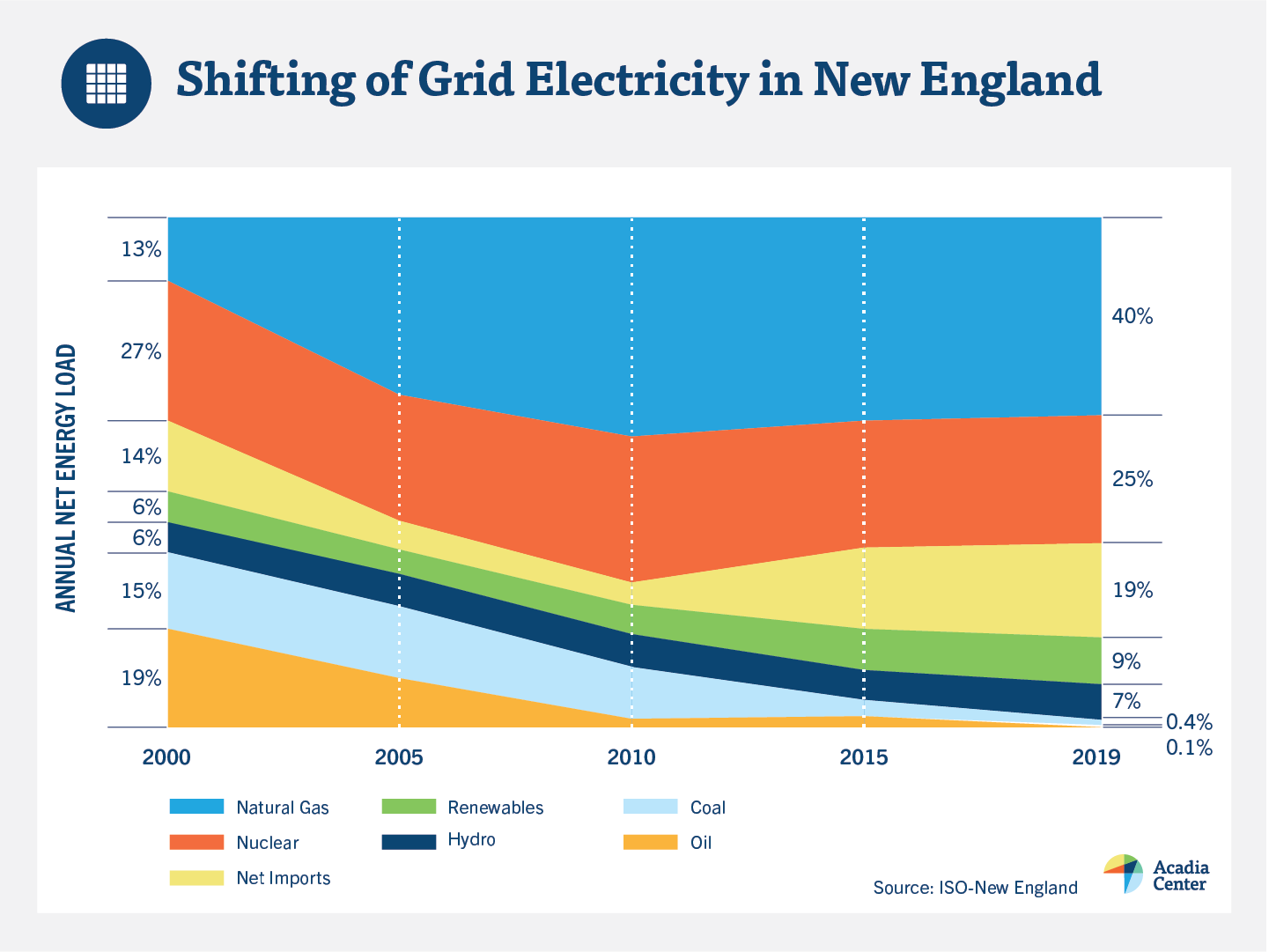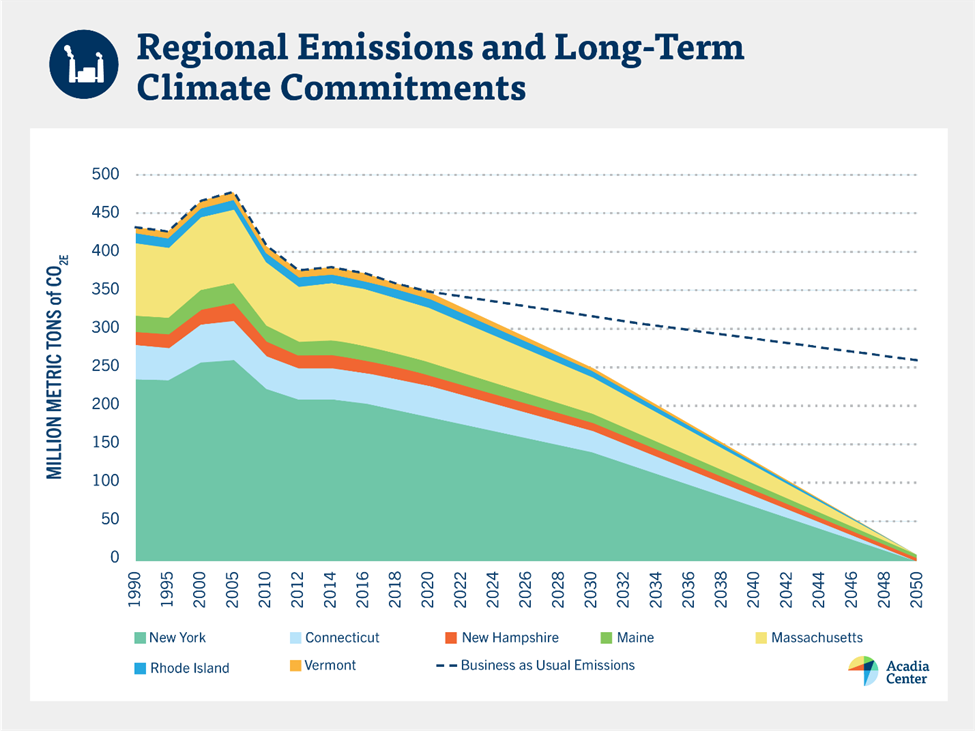New England Governors’ Energy Vision: Shifting Power on the Regional Electricity Grid
Acadia Center works at the forefront of the effort to move toward a just, equitable and climate-focused future for New England and the Northeast. Central to that shift is the urgent need to fundamentally reshape the system we rely on to deliver electricity over the regional grid. We must ensure the region has an electricity grid that can serve the needs of a fully electrified economy while rapidly evolving toward greater reliance on newer, cleaner, and more advanced energy technologies, including renewable generation powered by the wind and sun, energy storage, and flexible energy demand. The region must approach this transformation by putting the needs of customers at the center, especially the needs of those hose communities have borne a disproportionate economic burden of the detrimental impacts of energy, endured the damaging impacts of the fossil-fueled system and are at greatest risk when it comes to climate-driven disasters.
Today, the way the region’s electricity grid is planned and operates neglects to consider the climate crisis and environmental justice priorities while perpetuating our dependence on fossil fuels. That is largely because the grid is not currently managed to embrace viable clean energy technologies or consider the impacts of its decision on vulnerable communities. Over the last year, Acadia Center, states, and a multitude of stakeholders throughout the region have intensified their commitment to transform the electricity grid through reforms that will reduce the burdens the grid places on consumers and the planet and broaden the universe of stakeholders providing input into goals and priorities for the region. The outcome of these ongoing discussions will have far-reaching implications for achieving state climate policy goals and establishing a clear pathway toward a fully decarbonized economy.
Who’s got the power now?
The Independent System Operator of New England (ISO-NE) is a non-profit entity formed over 20 years ago to oversee the electricity grid that serves all six New England states. It manages the wholesale electricity market so there is sufficient electricity generation capacity to reliably and cost-effectively meet consumer demand at all times. When the ISO was created, electricity mostly came from centrally dispatched plants fueled by nuclear, hydropower, coal and oil, mostly owned and operated by for-profit corporations. Over the last two decades, the region’s energy needs have been increasing met through gas-fueled power plants as fracked gas became increasingly cheap and was perceived as lower-polluting than dirtier coal and oil.

There is one notable success story that demonstrates the meaningful benefits that state clean energy commitments provide to consumers and the climate. Investments in energy efficiency programs and solar energy have cut the region’s energy use by 15%, and continued expansions of efficiency and solar could result in as much as a 25% reduction, conferring significant savings and carbon reductions.
In many ways, ISO-NE’s decisions are stuck in this out-of-date world centered on fossil fuels. The status quo benefits the owners of today’s fleet of plants and is holding the region back from fully achieving a clean energy future. What’s more, the byzantine, exclusionary decision-making forums dominated by ISO staff, its board, and the powerful incumbent energy companies shut out the people most affected by the decisions that result.
What is needed?
Times have changed and our grid must change with it. Today, access to affordable, clean sources of electricity, and investing in efficiency and emerging technologies will enable us to transform the grid yet again into the grid of the future, one that equitably meets everyone’s needs as we face the climate crisis. And that means changing the mission of the entity that operates the grid to one that:
- Prioritizes attaining state policy goals for clean energy and climate emission reductions
- Supports the expansion of renewable energy resources, including community-based sources
- Ensures full consideration of the justice and equity implications of the grid’s impacts
- Makes decisions by accounting for all benefits (reducing carbon emissions) and costs (damaging public health and the climate)

Where’s it going? New England Governors’ Energy Vision of Regional Cooperation
In October 2020, the New England Governors released a Vision Statement expressing dissatisfaction with this status quo, and committing to fully transparent, publicly accessible regional discussion about three major areas of concern: wholesale energy market design; transmission infrastructure planning; and governance. After issuing their public commitment to regional cooperation in March 2019, the states have been frustrated with the slow progress and narrow scope of discussions happening behind closed doors between ISO leadership and members of NEPOOL, the regional stakeholder body. The Governors’ October Vision Statement describes in detail the states’ mutual concerns about the inability for the regional market to enable the states to meet their clean energy and climate goals in a timely and optimal way. Specifically, the statement:
- Lays out a set of minimum principles necessary to address the fundamental shortcomings of the energy market rules;
- Articulates the priorities for a significantly re-engineered transmission planning process; and
- Calls for an update of the ISO’s mission statement, governance structure, and mechanisms for stakeholder participation.
“A clean, affordable, and reliable regional electric grid – together with transparent decision-making processes and competitive market outcomes that fully support clean energy laws – is foundational to achieving our shared clean energy future… To achieve these goals, we need a decarbonized grid capable of supporting the accelerated adoption of more sustainable electric, heating, and transportation solutions for families and businesses.”
— Governors’ Statement on Electricity System Reform
The states committed to holding a series of public forums focusing on the three topics (wholesale energy market design, transmission infrastructure planning, and governance), and are seeking stakeholder input in the form of written comments. Overall, the Governors have set the stage for the region to reach resolution on a range of interrelated issues by putting state climate policy and stakeholder needs at the center of the process. Acadia Center strongly supports and presses for the commitment to reaching consensus solutions, understanding that politically durable progress must begin with states asserting themselves and taking control of the dialogue. Acadia Center and its coalition partners have attended three forums and have prepared comments on Market Design, Transmission Planning, and Governance issues. In Acadia Center’s comments, we have raised substantive policy reforms for consideration, including their implications for a just transition.
Thus far, calls for fundamental reforms have been met with strong resistance by the ISO and incumbent stakeholders that dominate the NEPOOL and ISO agendas. With the states opening the forums up to everyone, this process has the potential to bring about reforms that can bring the region an electricity system that is centered on the states’ climate commitments and protective of all the region’s residents. This process has the makings of a major paradigm shift.
What’s next? The Energy Vision Forum on Equity and Environmental Justice
While Acadia Center applauds the states for launching the Energy Vision initiative, we were concerned about the initial lack of focus on equity and environmental justice outcomes. It is essential that these values be considered when weighing the range of market design, transmission, and governance reforms. And that can only happen when the voices of front-line communities are part of the conversation from the beginning. After hearing about these concerns, the state organizers agreed to add a fourth forum focusing on environmental justice and equity.
On March 18, 2021, the states convened the fourth and final forum designed to be a dialogue between state policymakers and the public to address equity and environmental justice concerns. The virtual forum was free and presented in both English and Spanish. A recording of the session is located on the New England Energy Vision website as well as presentations by the speakers. Stakeholders can join the mailing list to hear about next steps by signing up here. In addition, stakeholders are invited to submit written comments regarding equity and environmental justice perspectives on the regional energy grid. Comments should be sent to Claire.Sickinger@ct.gov by April 29, 2021.
Conclusion
Acadia Center is working to ensure that New England has an electricity grid that can rapidly evolve toward greater reliance on cleaner, safer, and more affordable energy technologies, including renewable generation powered by the wind and sun, energy storage and flexible energy demand. The region’s governors have opened a dialogue on a range of interrelated issues by putting state climate policy and stakeholder needs at the center of the process. As the initiative progresses, Acadia Center will be pressing states to set and meet a high bar when it comes to delivering forward looking solutions that put equity and environmental justice concerns that their center. Acadia Center will work with allies to unlock the door to a clean energy future while pushing for greater accountability, transparency, fairness, and equity for the communities that bear the worst burdens of our fossil fueled electricity grid.
Additional Resources:
- Acadia Center remarks at the CT League of Conservation Voters 2021 Legislative Planning Summit
- Meeting recording [starting at minute 39]
- Acadia Center presentation at the Fix the Grid 101 webinar
- Meeting Recording, Access Passcode: Ncc?7.QH
- Massachusetts Attorney General’s office public education efforts such as the December 2020 Teach-In covering the regional markets and their role in transitioning to clean energy.



















Follow us